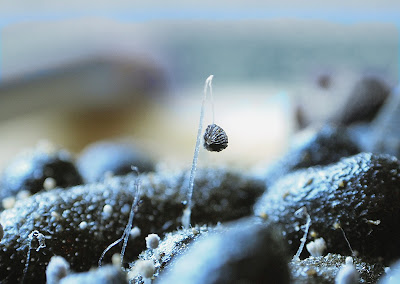29-01-13
19-02-13
24-02-13
24-02-13
If you look at the central pellet, there are tiny hair like projections. These are living nematodes which are wriggling around in the dung, which leads me to believe I am rearing a species of carnivorous fungi, also know as Nematophagous fungi that trap, kill and digest nematodes. There are approximately 200 different species. They trap the nematodes on vegetative hyphae or in specialised traps, such as constriction rings (examples are on this site http://www.biological-research.com/philip-jacobs%20BRIC/fangorg.htm). I shall know more later this week after I have received a positive identification, and update you all again asap.
Photo courtesy of www.nematology.ucdavis.edu
Here you can see the constriction ring around the nematode.
.JPG)
.JPG)




Some very weird but wonderful photos Ali, especially the bottom one. Glad to see you have an initial ID and as you said at the time they do resemble tiny Inkcaps in their immature stage.
ReplyDeleteFascinating Alison. Are the spores ingested by the animal first or is this contamination afterwards? and is it animal species specific?
ReplyDeleteHi Bruce, the spores are ingested along with the animal's food and excreted with the dung. The heat generated by its decomposition aids germination. With luck the first primitive fruit bodies appear after a few days followed by a succession of different species in time.
ReplyDeleteThanks Charlie
ReplyDeleteGreat work Alison.
ReplyDeleteThere's another amazing dung species called the Hat-throwing fungus, which shoots its cap and spores away from the wonderfully-named "Zone of Repugnance" onto fresh grass so the grazing animals will pick it up and continue the cycle.
There's a good BBC item about it somewhere on line (can't find it now) and a time-lapse video from Cornell University I've just seen while looking for the other. The BBC one was better.
Hi Steve,
ReplyDeleteThere is a time lapse video on this site, maybe this is what you've seen
http://blog.mycology.cornell.edu/2006/12/14/pilobolus-and-the-lungworm/
The Hat-throwing species are called Pilobolus, a great example is on Charlie's dung post.
The reishi one helps me sleep! moon chocolate bar
ReplyDeleteI love pairing chocolates with strawberries. Polka dot Chocolate
ReplyDelete